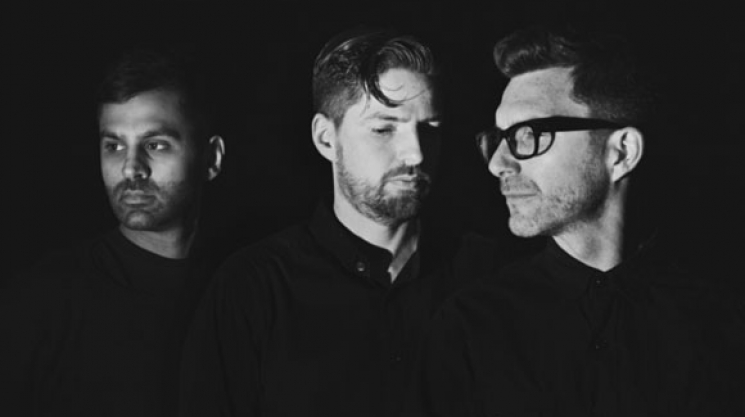
Fri, 05/23/2014 - 10:24 by Guest
Words: Josefa Cameron | Photos: Victoria Stevens
What sort of electrifying concoction can arise from the following: a 1990‘s cover band, New York City, life-long friendship, beauty, and synths? Why Brooklyn’s, RELATIONS, of course. The new wave nostalgia on their recently released Songbirds album is the result of a cultivated, and well-versed musical career. The trio–made up of Michael Sanders, Terence Murren, and Matthew Chokshi–initially began in the nineties as a Modern Lovers cover band, and have had their fair share of reforming and reshaping as a group. After two major releases in two years, RELATIONS find themselves reminiscing about their musical past with Josefa Cameron for ION.
How has forming a band in the 1990s impacted your music?
MICHAEL SANDERS: Terence and I had a Jonathan Richman cover band in high school, and we played for some high school event thing. It was the first time I ever performed in front of an audience; I think we had a couch on stage or something. The nineties era was when I first got into music. I will always be a child of the nineties, and NEDS ATOMIC DUSTBIN!!
What differences do you see between the music industry back then and today?
MS: We were hardly in "the industry" in the nineties, but I definitely remember the early 2000s and trying to tour without smart phones. It was terrible.
What made you reform as a band?
MS: I had a band that ended, and I reconnected with Terence after about eight years of living in different cities. It was just supernatural, well not SUPER natural. It took us about a year to get into a good songwriting flow, but it's definitely on now.
TERENCE MURREN: Mostly we wanted to hang out and see if anything came out of it. It was low pressure, and took about a year of tinkering to find our way. Mike and I had wandered into very different musical worlds, but once we got onto something, it sort of took over.
Apparently your songwriting focuses on, “finding beauty in the everyday grind and loss that is life and living”. How do you, as a band, find beauty in the everyday grind?
MATTHEW CHOKSHI: New York is the strangest place. The speed of the city is astounding, even having lived here for so long. It’s easy to make connections, but difficult to make those connections last. A lot of people see right past what’s in front of them because there's always the idea that there's something better, newer, and more interesting out there. But these tiny moments, when everything is cosmically in its exact spot, those moments are worth holding on to. And they get you through all the other bullshit. I think that’s one of our springboards for creativity in the band.
Do you want the notion of nostalgia to be brought through positively or negatively in your music?
MS: There's always a touch of sadness to nostalgia, but for me it's a nice feeling. It’s ultimately up to the listener and how they digest it. If we make anyone feel any emotion at all, good or bad, I feel like we've accomplished something.
How has the addition of a third member added to your sound?
MS: Matt's been huge for us, bringing in a different look at drum programming, and the overall vibe. Another set of hands that can play guitar or keys has been great for writing. Aside from the sound, he brings in his creative visual sense. He directed our first two videos!
TM: Matt's touch on the MPC and the space echo were immediately transformative of our sound, workflow, and brotherhood. The geometry of three just works better.
You are often compared to other new wave groups. What does it mean to be “new wave” to you?
MS: Good music is good music. We do like keyboards and drum machines, but we mostly have a drum machine because the only drummer we like to play with lives in Boston.
MC: There are a bunch of new wave-y songs that make you feel sad in that amazing kind of romantic way. Those are always good times.
TM: It was a golden age of synthesizers so that’s pretty fascinating.
MS: I am fascinated by any good music that has its roots in a punk ethos.
Is there some sort of message you wish to convey through your music?
MS: Make something. Go out and say what you want to. You're fooled into thinking, by those mind numbingly dull days, that this will all last forever, but it will be over before you know it.
What is music to you? An escape? A calling? A means to communicate? A fun past time? A career?
MS: For me, it's definitely the first two. A means to consistently be evolving, growing, and keeping myself entertained, so I guess the fourth one too.
MC: I come from the visual world, but have always had music in my life, be it in bands in my teens and early twenties, or spinning records, or what not. Honestly, this is the first time I can say that it’s an escape and a calling from somewhere to make music with these guys. I feel that what the three of us are creating right now is special.
TM: Music will be in my life for its duration, so I guess that makes it a calling. Plus, there is no better escape than hiding out in the practice space with these guys, trying to shape even the smallest idea into something.
What would be the best possible thing that could happen to Relations?
MS: If Relations ever paid for the three of us to live, I think that would be just wonderful.
Where did the name, Relations, come from?
MS: It's kind of a play on how Terence and I always get asked if we are brothers, which the three of us are in the spiritual sense. I like that it can mean a lot of different things, from banging, to the bearing two objects have to each other.
Who would you collaborate with if you had the chance?
MS: I want to collaborate on a music video with Kitty Green.
TM: We've been having a blast making videos. It would be amazing to work with Will Rahilly on one.
What does the future of Relations entail?
MS: Our goal is to put out an album every year until we are broke or infirm.
“If we make anyone feel any emotion at all, good or bad, I feel like we've accomplished something.”
Songbirds is out now.




Add comment